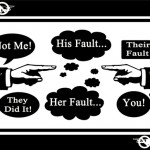 Last week’s posting about pass-through “caps,” such as for CAM Costs (or Operating Expanses), Taxes, Insurance Premiums, and the like engendered a lot of discussion here, on LinkedIn, and across various “back channels.” Much of that discussion wasn’t about “caps” themselves. It was about the mystery of how the Common Area Maintenance (CAM) Cost “sausage” is made. [Read more…]
Last week’s posting about pass-through “caps,” such as for CAM Costs (or Operating Expanses), Taxes, Insurance Premiums, and the like engendered a lot of discussion here, on LinkedIn, and across various “back channels.” Much of that discussion wasn’t about “caps” themselves. It was about the mystery of how the Common Area Maintenance (CAM) Cost “sausage” is made. [Read more…]
A Pig In A Poke And Other Lease Negotiation Sad Tales Of Woe
 Have you ever bought a $300,000 house solely based on reading a classified ad? What about doing a $3,000,000 lease (30 years, including options, at $100,000 a year) without ever seeing the property or at least taking a good “look” at the property from far away? Why would you NEVER buy a house that way, yet regularly do a lease based solely on a term sheet and with no other “due diligence” investigation? Simply said, you shouldn’t. [Read more…]
Have you ever bought a $300,000 house solely based on reading a classified ad? What about doing a $3,000,000 lease (30 years, including options, at $100,000 a year) without ever seeing the property or at least taking a good “look” at the property from far away? Why would you NEVER buy a house that way, yet regularly do a lease based solely on a term sheet and with no other “due diligence” investigation? Simply said, you shouldn’t. [Read more…]
What Would Rent Insurance Be If There Were Such A Thing?
 So, the lease requires the tenant to carry a policy of “rent insurance” or requires the landlord to carry a policy of “rent insurance” or, worse, requires both of them to do so. What does that policy say and how does it work?
So, the lease requires the tenant to carry a policy of “rent insurance” or requires the landlord to carry a policy of “rent insurance” or, worse, requires both of them to do so. What does that policy say and how does it work?
Trick question! You won’t find a rent insurance policy. You may find a commercial property insurance endorsement providing coverage for “rental value,” but don’t look for “rent insurance.” While you are at it, don’t call it: “rental interruption insurance,” “rent loss insurance,” or “rental income insurance.” Those are nice concepts, but lack any precise meaning. If you want to call it “use and occupancy insurance,” go ahead, but that form of policy is long, long gone. [Read more…]
PrintOldies Are Not Necessarily Goodies, Especially When You Find Such Terms In Your Leases And Other Contracts
 We wanted to address “Rent Insurance” today, but got somewhat distracted when we started out by writing “there really isn’t something called ‘Rent Insurance,’ even if lease writers insist otherwise.” We then were going to describe “Business Interruption and Extra Expense Coverage” because that’s really what lease writers are thinking when they say “Rent Insurance.” That was to take us into “how all of that works” and “where it doesn’t work.” It would have been pages long. [Read more…]
We wanted to address “Rent Insurance” today, but got somewhat distracted when we started out by writing “there really isn’t something called ‘Rent Insurance,’ even if lease writers insist otherwise.” We then were going to describe “Business Interruption and Extra Expense Coverage” because that’s really what lease writers are thinking when they say “Rent Insurance.” That was to take us into “how all of that works” and “where it doesn’t work.” It would have been pages long. [Read more…]
In A Lease, If I Didn’t Do It And You Didn’t Do It: Who Should Suffer The Loss?
 Stuff happens. Ask Bill Nye or David Hare.
Stuff happens. Ask Bill Nye or David Hare.
And, in modern America, it seems as if someone else is always at fault, not me. [If you take no blame, it must be them; Who must then pay my fines. It’s really is quite the cleverest ploy; By which illogic shines. – Gary Bachlund.]
Actually, there are times when bad things happen and the landlord and its tenant are each “good people.” Here are some examples: [Read more…]
PrintEverything Is Money In A Lease, But We Argue Mostly About Allocation Of Risk
 Money, that’s the only reason a landlord and its tenant do business with each other. There are some items that, by something that approaches natural law, are firmly in the court of one or the other. For example, landlords are expected to pay their own mortgages. Tenants are expected to pay their own employees. There may not be a lot of other examples. For instance, at first blush, one might think that the tenant gets to keep its sales revenue. That’s often true, but what about percentage rent clauses? [Read more…]
Money, that’s the only reason a landlord and its tenant do business with each other. There are some items that, by something that approaches natural law, are firmly in the court of one or the other. For example, landlords are expected to pay their own mortgages. Tenants are expected to pay their own employees. There may not be a lot of other examples. For instance, at first blush, one might think that the tenant gets to keep its sales revenue. That’s often true, but what about percentage rent clauses? [Read more…]
When I use the word, ‘Fixture,’ “It Means Just What I Choose It To Mean — Neither More Nor Less.” [Humpty Dumpty on Retail Leasing]
 What do we mean when we say something is a “fixture”? The most accurate answer is: “Who knows?” One reason for such uncertainty is that the answer depends on: (a) why you are asking; (b) who you are asking; (c) when you asked the question; and (d) where you were standing when you asked the question. The real reason is that the answer depends on the intent of the parties for whom the answer would be important.
What do we mean when we say something is a “fixture”? The most accurate answer is: “Who knows?” One reason for such uncertainty is that the answer depends on: (a) why you are asking; (b) who you are asking; (c) when you asked the question; and (d) where you were standing when you asked the question. The real reason is that the answer depends on the intent of the parties for whom the answer would be important.
What is not in doubt is that the question’s answer is important, for both leases and mortgages (and for taxation and some other kinds of issues). [Read more…]
Print

Recent Comments